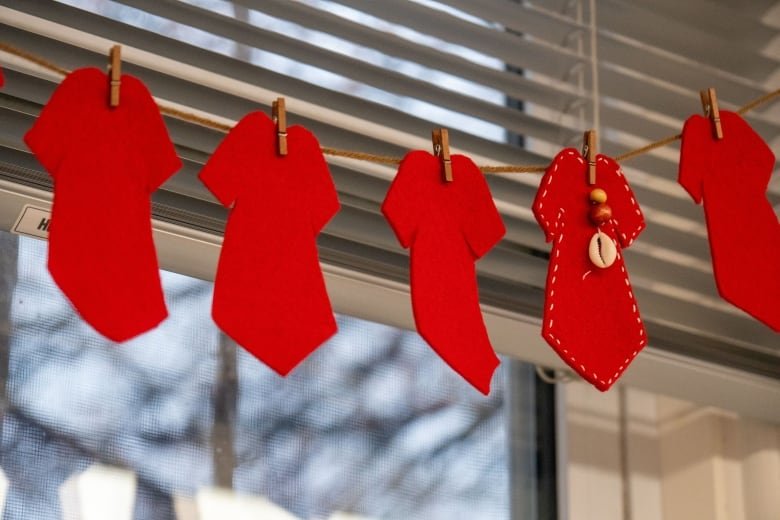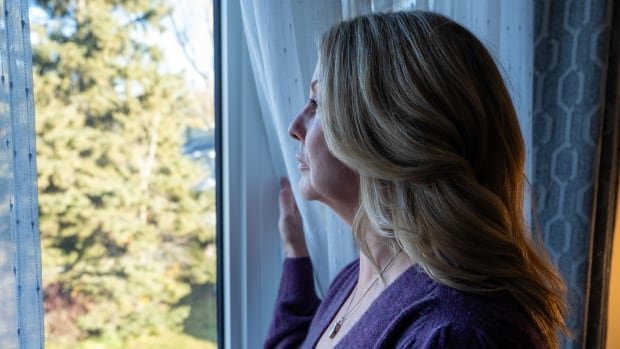Warning: This story contains references to intimate partner violence.
Billie Jo Barrett says it’s hard talking about her experiences with domestic violence, but it’s more difficult knowing other survivors have had their court cases stayed due to challenges in the justice system.
That’s part of the reason Barrett, who lives in Thunder Bay with her Boston terrier Bruce, is calling on Ontario to declare intimate partner violence an epidemic, as dozens of Ontario municipalities and several other provinces and the territories already have.
Barrett said her former partner was charged after he was accused of trying to strangle her during three separate incidents. CBC obtained court documents that say he was charged in October 2021 with assault with a weapon or imitation weapon. He was also charged between November 2022 and January 2023 with spousal assault, two counts of assault causing bodily harm – choke, suffocate or strangle, two counts of forcible confinement, mischief under $5,000, and failure to comply with a probation order.
However, due to a lack of evidence, the court case was stayed, meaning all the charges were effectively dropped.
The justice system is not treating women’s safety as though it’s public safety.– Gwen O’Reilly, Northwestern Ontario Women’s Centre
Barrett believes a shortage of court staff also played a role in the case’s outcome.
“The day that I was to go to court, court was overbooked. There were not enough judges. There were blackouts, so I felt that my case was de-prioritized,” Barrett said.
She is also concerned about the growing number of criminal cases that aren’t making it to trial due to court backlogs and what that means for survivors seeking justice.
Billie Jo Barrett says she wants to see changes in Ontario’s justice system to make it easier for other survivors of domestic violence to come forward. Here’s what the Thunder Bay, Ont., resident is calling for.
CBC News recently learned that 56 per cent of all criminal cases in Ontario between 2022-2023 ended with charges being withdrawn, stayed, dismissed or discharged before a decision was made at trial.
“For myself, knowing how difficult it was to come forward, it concerns me that other women will be afraid to come forward as well, knowing that in most cases, these situations don’t usually end up in court for whatever reasons,” Barrett said.
Thunder Bay’s rate of police-reported intimate partner violence is among the highest in Canada: 551 per 100,000 population in 2022.
Advocates say besides being symbolic of how important the issue is, declaring intimate partner violence as an epidemic would result in more resources being allocated to front-line service providers, like women’s centres, victim services and the courts.
“I don’t feel it should be up to the victims, the survivors, the families that it has impacted, to be responsible for change,” Barrett said. “I think that the government, that our lawmakers need to take a very serious look at this.”
Federally, the Senate passed Bill S-249, known as Georgina’s Law, Tuesday night after a third reading. This will require Canada to create a national strategy within two years to prevent intimate partner violence and require that the government update all Houses of Parliament on what actions have been taken every two years. The next step is for the bill to go through the House of Commons.
‘The evidence for that violence disappears’
The City of Thunder Bay is among 95 Ontario municipalities to declare intimate partner violence an epidemic. As well, six provinces (Alberta, Manitoba, Newfoundland and Labrador, Nova Scotia, Prince Edward Island and Saskatchewan), and the Northwest Territories, Nunavut and Yukon have enacted specific legislation on family violence.
Gwen O’Reilly, executive director of the Northwestern Ontario Women’s Centre, said not much has changed since Thunder Bay’s declaration last year.
“I did not expect this situation to get worse, but that is what we’re seeing,” O’Reilly said. “What we see is that the justice system is not treating women’s safety as though it’s public safety.”

With the goal of getting cases to court within reasonable timelines, the 2016 Supreme Court of Canada ruling known as the Jordan decision determined trials must be heard within 18 months after charges are laid.
But staffing shortages in the courts have contributed to hundreds of criminal cases exceeding this timeline.
When criminal cases involving domestic violence are stayed, “the evidence for that violence disappears,” said O’Reilly.
“We see this pattern of a lack of sanction and therefore a lack of accountability, and therefore invisibility — and so when women are dealing with the child welfare system or in family court … as far as the record shows there, nothing’s happened.”
Ontario working to get cases ‘heard faster’
In an emailed statement to CBC News, a spokesperson for the Ministry of the Attorney General said Ontario has spent $29 million this year to “appoint a minimum of 25 new judges to the Ontario Court of Justice, along with 190 more Crown prosecutors, and hundreds of victim support and court staff.”
“Recruitment is underway to ensure cases are heard faster and reduce the backlog across the criminal justice system,” said press secretary Jack Fazzari.
CBC requested a breakdown of how many personnel are being allocated to northwestern Ontario, but did not receive a response by publication time.

An Ontario-wide bill to declare intimate partner violence an epidemic passed second reading on April 10, before being referred to the standing committee on justice policy. The New Democratic Party says a motion to pass the bill was struck down on the first day of the fall session this year.
“Ontario should be passing Bill 173 instead of studying it,” O’Reilly said. “There’s no reason to study this issue. We have all the evidence we need to understand that it’s a problem.”
Both Thunder Bay–Atikokan Conservative MPP Kevin Holland and Thunder Bay–Superior North NDP MPP Lise Vaugeois told CBC they support the bill.
Ontario opposition members are pushing the Ford government to declare intimate partner violence an ‘epidemic.’ Advocates say such a declaration would make it easier for victims to get legal protections and support.
Michael Parsa, Ontario’s minister for children, community and social services, said the government has supported the bill, but continues to review and hear from experts on the issue.
“We have made a commitment to make sure [service providers] have the supports and resources to continue to provide those supports to families,” Parsa said.
He said the government invests $1.4 billion annually to ensure supports and services are available to families in Ontario, and has partnered with the federal government on the National Action Plan to End Gender-Based Violence.
“I would like to see the entire system overhauled, and I know it won’t happen overnight, but by Ontario declaring intimate partner violence an epidemic, that’s a good start,” said Barrett.
‘Forgiveness is not a cure for injustice’
Thunder Bay and Area Victim Services (TBAVS) receives at least 10 calls a week from new people seeking services related to intimate partner violence.
“That’s really high for a city the size of Thunder Bay,” said TBAVS executive director Penny Radford.
The Thunder Bay Police Service (TBPS) reported 2,300 incidents of intimate partner violence in 2022 in the city, which has a population of about 111,000, with 703 charges against 267 individuals. CBC News has reached out to the police service for the latest statistics and will update this story once that information is provided.

Barrett wants Ontario to pass what’s known as Clare’s Law in the U.K. — it allows police services to disclose information to a potential victim about whether their partner has a history of violence. Ontario’s version, Bill 274, didn’t make it past the second reading.
“I feel that I was not given the opportunity to make an informed decision as to whether or not I wanted to continue in a relationship with this person, had I known of his violent past,” she said.
One positive trend Radford has seen in Thunder Bay is a rising number of men seeking support related to intimate partner violence — something they may have felt too stigmatized to access in the past.
There are also more programs in the city for men that are susceptible to violence, such as the Caring Dads group through Faye Peterson House.
However, Radford said, it’s important to look at the broader stressors that contribute to violence in the first place, such as the rising cost of living, mental health and addictions — concerns she hears in a lot of calls made to TBAVS.
“When there’s nowhere to go and you can’t go to detox, or you have nowhere to go and the beds aren’t available … then that violence comes home, right?”
Barrett and Bruce wore purple during their interview with CBC News, in recognition of November being Domestic Violence Awareness Month.
Her hope is that by sharing her story, other survivors will know they’re not alone, and those in power will be reminded of the urgent need for change.
“It was very difficult for me to come forward in the first place. I was full of shame, and if the justice system doesn’t support me, then who does? Who supports the women who are also experiencing the same thing? Who supports the women that have been murdered?” said Barrett.
“I believe in forgiveness, but forgiveness is not a cure for injustice. Justice is.”
Victims of domestic violence are not alone. In the Thunder Bay area, there are several support programs available for survivors and their families. The federal government also has a website where you can find provincial and territorial help resources. If you are in immediate danger, call 911.
















